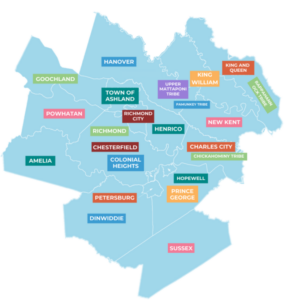A Lifeline in Times of Crisis: Developing Climate Resilience Hubs for the Richmond Region

PlanRVA, on behalf of the Richmond Metropolitan Statistical Area (MSA), was awarded a $1.5 mm FEMA grant through the Regional Catastrophic Preparedness Grant Program to conduct a comprehensive needs assessment and create an implementation plan for Climate Resilience Hubs over the next three years.
These hubs will protect vulnerable populations, including those who are unhoused, during extreme weather events and other disasters. Resilience Hubs will provide critical services, such as shelter, food, medical care, and personal hygiene facilities, particularly for those most at risk during disasters.
Outside times of disaster, resilience hub facilities may function as community centers or similar facility and function roles in the community. The project will strengthen community resilience and reduce long-term vulnerability to catastrophic events across urban, suburban, and rural communities within the Richmond region.
Project Goals:
Create a detailed strategy for establishing Resilience Hubs as safe, accessible shelters that provide critical support during times of crisis.
Outline a continuum of care for vulnerable and unhoused populations, aiming to improve housing support during disasters and reduce long-term risks.
Build a coalition of local organizations and agencies, including key groups like the Greater Richmond Continuum of Care (GRCoC) and the Emergency Management Alliance of Central Virginia (EMACV), to collaboratively guide and support the development of the Resilience Hubs.
Conduct a gap analysis to identify ideal locations for Resilience Hubs across the region, considering diverse needs in urban, suburban, and rural areas.
Establish climate-responsive triggers for Hub activation, ensuring that communities know when and where they can access these resources. Implement effective public education and signage to raise awareness.

Localities: Amelia, Town of Ashland, Charles City, Chesterfield, Colonial Heights, Dinwiddie, Goochland, Hanover, Henrico, Hopewell, King and Queen, King William, New Kent, Petersburg, Powhatan, Prince George, City of Richmond, Sussex,
Tribes: Chickahominy Indian Tribe, Chickahominy Indian Tribe Eastern Division, Pamunkey Indian Tribe, Rappahannock Indian Tribe, Upper Mattaponi Indian Tribe,
Key Project Takeaways:
- Enhanced Regional Resilience: This plan will increase the Richmond region's preparedness and ability to respond to catastrophic events, fostering a more resilient community.
- Support for Vulnerable Populations: Resilience Hubs will provide critical services, such as shelter, food, medical care, and personal hygiene facilities, particularly for those most at risk during disasters.
- Collaborative Community Effort: By uniting local organizations and agencies, this project promotes a coordinated response and ensures the resources are available where they are most needed.
- Sustainable Planning for the Future: The project will explore funding options to maintain and expand the Resilience Hub network over the long term, creating lasting support for the region.
This project is a significant step toward a resilient Richmond region that can better anticipate and respond to climate-related and other catastrophic challenges.